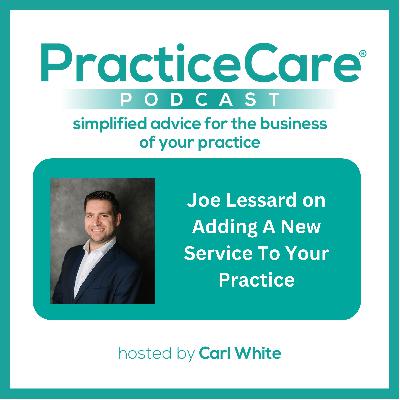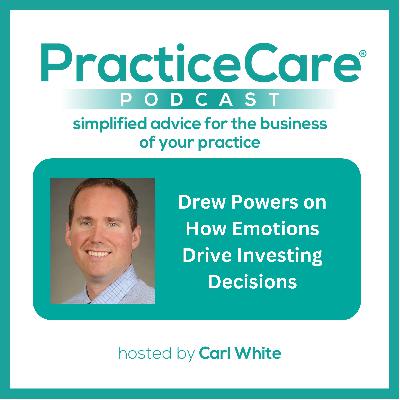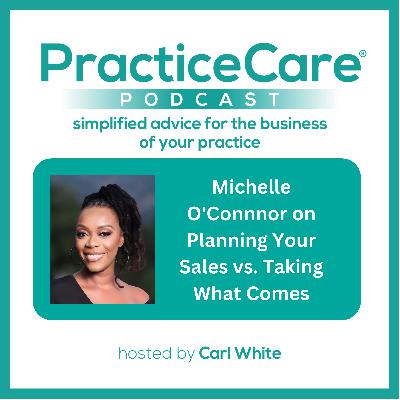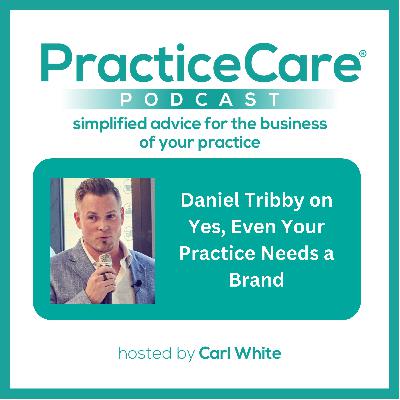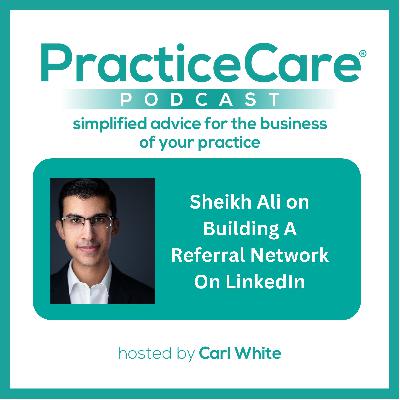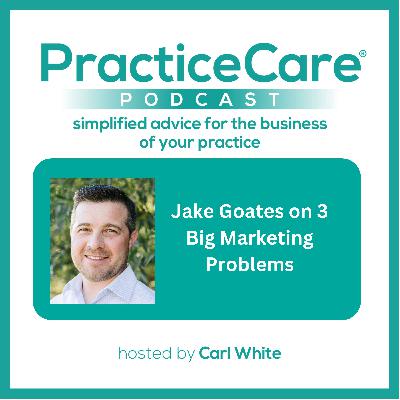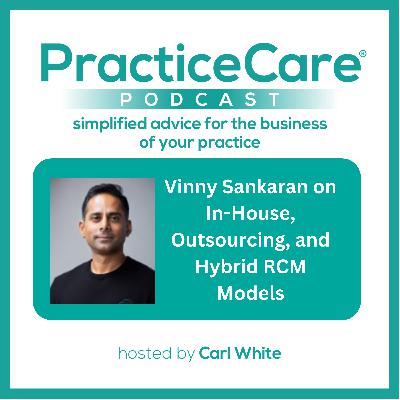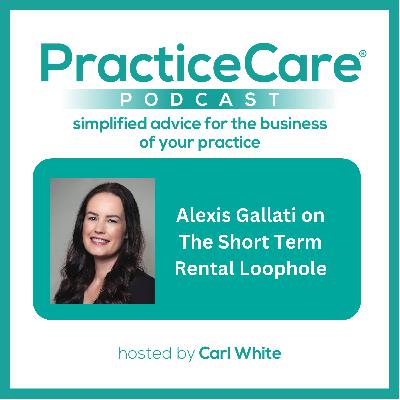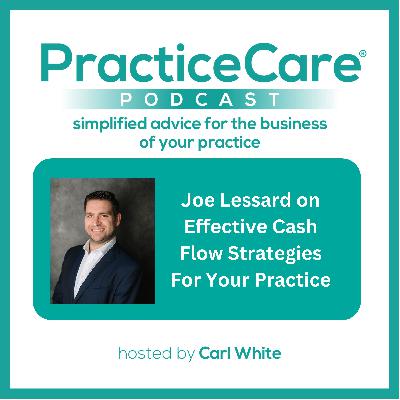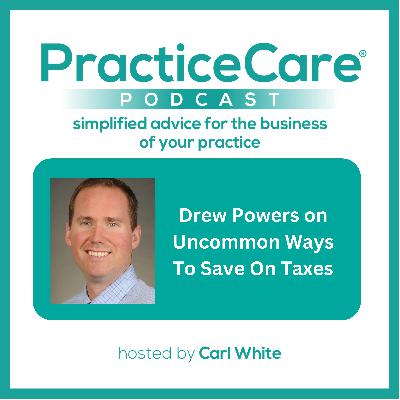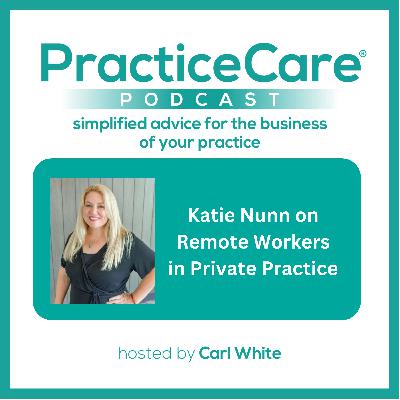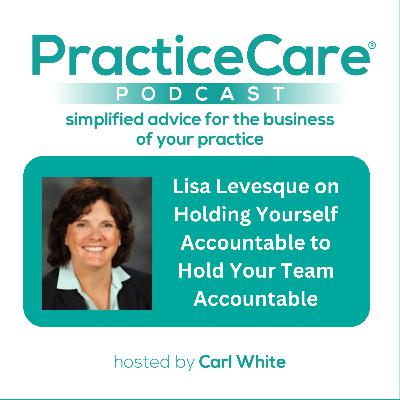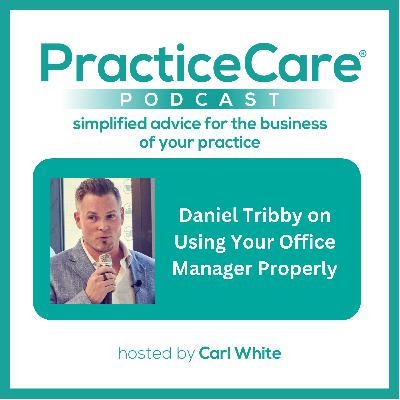Discover PracticeCare
PracticeCare

PracticeCare
Author: Carl White
Subscribed: 0Played: 3Subscribe
Share
© MarketVisory Group, Inc.
Description
PracticeCare is devoted to helping private practice owners in healthcare stay private. We do that via guests who offer bite-sized business experience and advice…the kind you didn’t get in school. Our guests are private practice owners and service providers who help them. If you want to know just enough about business decisions you face to make a good one, PracticeCare is for you.
194 Episodes
Reverse
Private practice might seem like it’s on the ropes, but new ones actually start all the time. Who are the successful ones? Those who weigh out the pros and cons and really think through the business side of the practice. My guest today helps physicians figure out these questions, and he’ll share some of this thinking with us.Adam Middleton has committed his entire professional career to healthcare, working at for profit and not for profit hospitals and as a consultant to physicians and healthcare related businesses. Since 2008, Adam has consulted with emerging businesses in leadership positions, physician practices, post-acute providers and hospitals with focus on management, operations, finance and strategic planning. He has extensive experience in physician compensation including contracting and structures. Through his leadership Healthcare Advisory Network assists hospitals and practices determine fair market compensation and compliance issues that surround employment practices.In this episode Carl White and Adam Middleton discuss:What is the current environment for medical practice start-ups?What are the biggest concerns for a provider thinking about starting?How do you determine where to start?How can I get contracts?What are the different models could consider?How will the finances work?How long will it take and how much money do I need??Want to be a guest on PracticeCare®?Have an experience with a business issue you think others will benefit from? Come on PracticeCare® and tell the world! Here’s the link where you can get the process started.Connect with Adam Middletonwww.linkedin.com/in/adammiddletonhanchbcConnect with Carl WhiteWebsite: http://www.marketvisorygroup.comEmail: whitec@marketvisorygroup.comFacebook: https://www.facebook.com/marketvisorygroupYouTube: https://www.youtube.com/channel/UCD9BLCu_i2ezBj1ktUHVmigLinkedIn: http://www.linkedin.com/in/healthcaremktg
Should you add a new service to your practice? That depends on the answers to a few important questions, which unfortunately, we don’t see enough practices asking and answering before they do. My guest today helps his clients develop informed answers, and he’ll share his thinking with us.Joe Lessard is a partner at Professional Business Management, a healthcare practice management and accounting firm in the northwest Chicago suburbs. Joe has been with PBM since 2009 and a Principal since 2020. He has attained designations as a Certified Public Accountant (CPA), Health Practice Advisor (HPA), and as a Certified Healthcare Business Consultant (CHBC). He believes in rolling up his sleeves and is usually on site visiting his clients’ operations first-hand. Joe is responsible for all accounting and payroll services as well as personal and business tax returns for his clients. He helps them review operations and day-to-day aspects such as HR, employee benefits, retirement plans, collections, billing, and patient interactions. Every client has different needs and that’s why Joe’s commitment to his clients’ needs and his customer service is what he prides himself on.In this episode Carl White and Joe Lessard discussWhy the most important question is: “does the market I serve need this service?” Additional important questions, such as who the competition is, why you think you can deliver the service better, and how you’d deliver the service day to dayExamples Joe has of success stories and failure storiesWant to be a guest on PracticeCare®?Have an experience with a business issue you think others will benefit from? Come on PracticeCare® and tell the world! Here’s the link where you can get the process started.Connect with Joe Lessardhttps://www.linkedin.com/in/joelessardpbm/https://www.instagram.com/thedoctorscpa/For more depth on this episode, read Understanding and Managing Overhead Costs in Your Practice, a blog this guest wrote about it. Connect with Carl WhiteWebsite: http://www.marketvisorygroup.comEmail: whitec@marketvisorygroup.comFacebook: https://www.facebook.com/marketvisorygroupYouTube: https://www.youtube.com/channel/UCD9BLCu_i2ezBj1ktUHVmigLinkedIn: http://www.linkedin.com/in/healthcaremktg
Agree or disagree – doctors and dentists are perfectly rational people who always make rational, emotionless decisions. It’s best that you disagree. They’re humans just like the rest of us, which means emotions get into their decision making. My guest today helps his doctor and dentist clients plan their financial futures, including managing their emotions along the journey, and he’ll help us understand how you can manage them, too. Drew Powers is the Founder of Powers Financial Group, LLC, a Registered Investment Advisor. He specializes in advanced insurance and investment strategies for doctors. Drew is 100% independent, he doesn’t work with any investment or insurance company, which means he’s able to give unbiased advice that is most beneficial for his clients. Drew started his career in 2001 as a Market Maker on the Chicago Board Options Exchange, where he managed trading portfolios comprising of hundreds of equity- and equity-index option listings. In 2008, he transitioned to the role of Financial Advisor and Investment Advisor Representative, where he helped clients develop individual financial strategies. At Powers Financial Group, Drew leverages his stock and options trading expertise with his financial advising experience to help clients increase and protect their wealth. Drew lives in Naperville with his wife and their two children. He is an avid downhill skier, active in youth sports, a proud "Rooster" within the Naperville Jaycees, and is passionate about CrossFit and the Paleo/Primal Lifestyle.In this episode Carl White and Drew Powers discuss:The viscous circle of behavioral financeWhat causes the viscous circleWhy realizing that money is emotional is critical to breaking the viscous circleWant to be a guest on PracticeCare?Have an experience with a business issue you think others will benefit from? Come on PracticeCare and tell the world! Here’s the link where you can get the process started.Connect with Drew Powershttps://powersfg.com/https://www.linkedin.com/in/powersdrew/https://www.facebook.com/PowersFGhttps://twitter.com/Powers_FGhttps://www.instagram.com/powers_fg/Connect with Carl WhiteWebsite: http://www.marketvisorygroup.comEmail: whitec@marketvisorygroup.comFacebook: https://www.facebook.com/marketvisorygroupYouTube: https://www.youtube.com/channel/UCD9BLCu_i2ezBj1ktUHVmigLinkedIn: http://www.linkedin.com/in/healthcaremktg
Sales feed your income, which pays your bills and fuels your dreams. Since sales are so important, why wouldn’t you build a plan that drives sales instead of just taking what comes? My guest today helps her clients build plans that lead to the business outcomes they want, and she’ll answer this question for us.Michelle O’Connor, a believer in following one’s dreams, has risen from an inner-city community to a life of abundance. With corporate expertise in Strategic Planning and Execution, she helps entrepreneurs achieve their goals. Michelle supports organizations through strategic processes, coaching entrepreneurs to develop action plans for success. She has facilitated Strategic Planning Retreats in Jamaica, Trinidad & Tobago, and the Dominican Republic, and reached hundreds through her Purpose Driven Conference. Her current mission is to help Medical Private Practice Owners create sustainable practices. As a wife and mother, she strives for a brighter future, motivated by the philosophy “Ad Astra Per Aspera.”In this episode Carl White and Michelle O’Connor discuss:What the difference is between hope and strategyWhy so few practice owners plan their salesExamples of what practice owners do that they think is planning but really is notWant to be a guest on PracticeCare®?Have an experience with a business issue you think others will benefit from? Come on PracticeCare® and tell the world! Here’s the link where you can get the process started.Connect with Michelle O’ConnorLinkedIn - https://www.linkedin.com/in/michelletoconnor/Facebook - https://www.facebook.com/successbiznessclubInstagram - https://www.instagram.com/successbiznessclub/Connect with Carl WhiteWebsite: http://www.marketvisorygroup.comEmail: whitec@marketvisorygroup.comFacebook: https://www.facebook.com/marketvisorygroupYouTube: https://www.youtube.com/channel/UCD9BLCu_i2ezBj1ktUHVmigLinkedIn: http://www.linkedin.com/in/healthcaremktgEpisode MentionedVideo - https://youtu.be/UGRzyEJ1ajQPodcast - https://practicecare.simplecast.com/episodes/david-kading-get-more-patients-you-want
While I love marketing, I hate marketing jargon. Tops on my list: Brand. It’s a hugely important word, whose definition my industry has completely messed up. My guest today consults with practices about many things marketing, and together we’ll take on the task of simplifying what brand means and why even you need one.Daniel Tribby is a healthcare provider, effective business growth strategist, award winning author, top keynote speaker with a vision to help healthcare entrepreneurs build a practice that serves it's patients and sustain profitability for the long term.In this episode Carl White and Daniel Tribby discuss:The definition of brandLimits on your practice of not having a brandOpportunities to your practice if you have an effective brandWant to be a guest on PracticeCare?Have an experience with a business issue you think others will benefit from? Come on PracticeCare and tell the world! Here’s the link where you can get the process started.Connect with Daniel Tribbyhttps://www.linkedin.com/in/iamdanieltribby/Connect with Carl WhiteWebsite: http://www.marketvisorygroup.comEmail: whitec@marketvisorygroup.comFacebook: https://www.facebook.com/marketvisorygroupYouTube: https://www.youtube.com/channel/UCD9BLCu_i2ezBj1ktUHVmigLinkedIn: http://www.linkedin.com/in/healthcaremktg
If you take health insurance as payment, payers are a big part of your practice. What happens when they mess up? How do you hold them accountable? Can you hold them accountable? My guest today says the answer is “yes”. He runs a business that spends a lot of time holding payers accountable for their clients, and he’ll help us break this down.David Zetter is the founder and President of Zetter HealthCare, LLC in Mechanicsburg, PA and has over 24 years of operational and healthcare experience. David is nationally recognized for his speaking, presentations and healthcare business expertise. He is well versed in regulatory requirements, revenue cycle management, credentialing and contracting, compliance, coding and documentation. He is considered an expert on Medicare, not only by his clients, but also through consultant colleagues and healthcare attorneys across the country. David is an expert on ERISA regulations, which protect over 80% of the claims in the US, and he knows how to stop payor recoupments dead in their tracks and what is legal and illegal in many payor contracts. David’s firm works with healthcare professional clients and facilities coast to coast, in all areas of practice and facility management.In this episode Carl White and David Zetter discuss:In what areas are you able to hold payors accountable?Are there laws, guidance or regulations that support you in holding payors accountable?How does it work or can you tell me how ZHC holds payors accountable and how can practices and providers do so?Want to be a guest on PracticeCare®?Have an experience with a business issue you think others will benefit from? Come on PracticeCare® and tell the world! Here’s the link where you can get the process started.Connect with David Zetterhttps://zetter.com/https://www.linkedin.com/company/zetter-healthcare/https://www.facebook.com/zetterhchttps://www.instagram.com/zetterhealthcare/Connect with Carl WhiteWebsite: http://www.marketvisorygroup.comEmail: whitec@marketvisorygroup.comFacebook: https://www.facebook.com/marketvisorygroupYouTube: https://www.youtube.com/channel/UCD9BLCu_i2ezBj1ktUHVmigLinkedIn: http://www.linkedin.com/in/healthcaremktg
A referral network is the lifeblood of many specialists, and LinkedIn has its place to help you build that network. LinkedIn is a rich platform with tons of features, so you better know what you’re doing. My guest today specializes in helping his clients build their brand on LinkedIn, and he’ll share some ideas with us.Sheikh C. Ali is a former medical student who pivoted to entrepreneurship. He is the Founder and Owner of SC Medical Media, a LinkedIn marketing company specifically for clinician and healthcare executives. For the past year, he has been solely focusing on LinkedIn because of its dominance in the social media B2B space. His goal is to help clinician and healthcare executives build their authority and personal brand on LinkedIn, and use that to attract potentially lucrative B2B opportunities. In his spare time, Sheikh is an avid cinephile (especially James Bond films) and a collector of luxury pens.In this episode Carl White and Sheikh Ali discuss:Who spends time on LinkedInWhat good goals are when spending time on LinkedInPitfalls to avoidWant to be a guest on PracticeCare®?Have an experience with a business issue you think others will benefit from? Come on PracticeCare® and tell the world! Here’s the link where you can get the process started.Connect with Sheikh Alihttps://www.linkedin.com/in/sheikhali007/Connect with Carl WhiteWebsite: http://www.marketvisorygroup.comEmail: whitec@marketvisorygroup.comFacebook: https://www.facebook.com/marketvisorygroupYouTube: https://www.youtube.com/channel/UCD9BLCu_i2ezBj1ktUHVmigLinkedIn: http://www.linkedin.com/in/healthcaremktg
Whenever anyone says “marketing problems” they think of things like volume of new patient leads, website and social traffic, return on ad spend, and the like. But are those truly the biggest marketing problems? My guest today says they are not, and I agree with him. What are they? Listen and find out.Since 2003, Jake Goates has given group seminars and training on sales and marketing. He is a Key Opinion Leader for various dental marketing companies. Since 2013, Jake has personally consulted more than 5,600 dentists nationwide on their marketing strategies and sales skills to reduce unnecessary spend while increasing collections. Jake founded GOAT Dental Marketing Consultants in early 2023, providing marketing strategy and sales coaching for dental offices across the country. Jake, with his wife and two daughters, enjoy living and playing in the mountains of Northern Utah.In this episode Carl White and Jake Goates discuss:Setting expectations, and realistic expectations, in a marketing planThe importance of communication – between the marketing agency and the client, inside the marketing agency, and inside the clientWhy accountability is so crucial – to communicate realistic expectations, to those expectations, to raise issues early, etc.Want to be a guest on PracticeCare®?Have an experience with a business issue you think others will benefit from? Come on PracticeCare® and tell the world! Here’s the link where you can get the process started.Connect with Jake Goateshttps://www.linkedin.com/in/jake-goates-a8908a12/ https://www.facebook.com/profile.php?id=61553719583016Connect with Carl WhiteWebsite: http://www.marketvisorygroup.comEmail: whitec@marketvisorygroup.comFacebook: https://www.facebook.com/marketvisorygroupYouTube: https://www.youtube.com/channel/UCD9BLCu_i2ezBj1ktUHVmigLinkedIn: http://www.linkedin.com/in/healthcaremktgEpisode MentionedPodcast - https://practicecare.simplecast.com/episodes/jake-goates-managing-leads-more-important-than-generating-themVideo - https://youtu.be/Rl6TE4Uv6fw
If you take insurance, then you know about Revenue Cycle Management (RCM). The industry keeps evolving. You can bring your RCM in house, outsource it, or mix and match them. Not sure what to choose? Thinking so changing what you’re doing now? My guest today will break each option down for us to help you out.Vinod (Vinny) brings over 15 years of experience in operations, financial analysis, strategy, growth, corporate development, strategic planning, and marketing. At Medical Billing Wholesalers, he is involved in applying his experience to optimize revenue cycle process flows to improve our clients' profitability and performance.In this episode Carl White and Vinny Sankaran discuss:In house, outsourcing, and hybrid options to do your RCMSimilarities and differences between themWhich ones are better fits than others depending on a practice’s descriptionWant to be a guest on PracticeCare®?Have an experience with a business issue you think others will benefit from? Come on PracticeCare® and tell the world! Here’s the link where you can get the process started.Connect with Vinny Sankaranhttps://www.linkedin.com/in/vinodsankaran/Connect with Carl WhiteWebsite: http://www.marketvisorygroup.comEmail: whitec@marketvisorygroup.comFacebook: https://www.facebook.com/marketvisorygroupYouTube: https://www.youtube.com/channel/UCD9BLCu_i2ezBj1ktUHVmigLinkedIn: http://www.linkedin.com/in/healthcaremktg
Why do some doctors get paid more for the same treatment than others? Even in the same city? Chances are the doctors who get paid more have a solid payer strategy. What does it take? My guest today helps his clients develop a solid payer strategy, and he’ll tell us all about it.Adam Middleton has committed his entire professional career to healthcare, working at for profit and not for profit hospitals and as a consultant to physicians and healthcare related businesses. Since 2008, Adam has consulted with emerging businesses in leadership positions, physician practices, post-acute providers and hospitals with focus on management, operations, finance and strategic planning. He has extensive experience in physician compensation including contracting and structures. Through his leadership Healthcare Advisory Network assists hospitals and practices determine fair market compensation and compliance issues that surround employment practices.In this episode Carl White and Adam Middleton discuss:The main areas of concern for a practice when it comes to payer contractsWhat payers are looking for from practicesHow to tell what payers are willing to negotiateHow to find your payment rates compared to your marketWant to be a guest on PracticeCare®?Have an experience with a business issue you think others will benefit from? Come on PracticeCare® and tell the world! Here’s the link where you can get the process started.Connect with Adam Middletonwww.linkedin.com/in/adammiddletonhanchbcConnect with Carl WhiteWebsite: http://www.marketvisorygroup.comEmail: whitec@marketvisorygroup.comFacebook: https://www.facebook.com/marketvisorygroupYouTube: https://www.youtube.com/channel/UCD9BLCu_i2ezBj1ktUHVmigLinkedIn: http://www.linkedin.com/in/healthcaremktg
Looking for a way to reduce your taxes? Have a second property like a vacation home? The short term rental loophole can help you deploy your vacation home to reduce your taxes? How does it work? What are the requirements? My guest today runs an accounting firm that helps their medical clients get efficient on taxes, including using the short term rental loophole when it applies. She’ll explain all of this to us.Alexis E. Gallati is the founder and Lead Tax Strategist at Cerebral Tax Advisors and Cerebral Wealth Academy, and she’s the author of the book Advanced Tax Planning for Medical Professionals. She has over 20 years of experience in high-level strategic tax planning and multi-state tax preparation, and she has trained at the highest level, holding two master’s degrees. Alexis grew up in a family of physicians and is married to a private practice physician. That’s why she understands how hard medical professionals work to get where they are and why she provides simple and accessible tax solutions tailored to busy physicians.In this episode Carl White and Alexis Gallati discuss:What the passive income rules areThe benefits of using this loopholeThe requirements to qualifyWant to be a guest on PracticeCare?Have an experience with a business issue you think others will benefit from? Come on PracticeCare and tell the world! Here’s the link where you can get the process started.Connect with Alexis GallatiResources from Cerebral Tax Advisors: https://www.cerebraltaxadvisors.com/practicecare/Cerebral Tax Advisors Facebook: https://www.facebook.com/cerebraltaxCerebral Wealth Academy Facebook: https://www.facebook.com/cerebralwealthacademy YouTube: https://www.youtube.com/@cerebralwealthacademyPersonal LinkedIn: https://www.linkedin.com/in/alexis-gallati/Connect with Carl WhiteWebsite: http://www.marketvisorygroup.comEmail: whitec@marketvisorygroup.comFacebook: https://www.facebook.com/marketvisorygroupYouTube: https://www.youtube.com/channel/UCD9BLCu_i2ezBj1ktUHVmigLinkedIn: http://www.linkedin.com/in/healthcaremktg
Incentives in compensation, used appropriately and ethically, are effective tools to help you grow your practice. You need to think them through. What sounds good on paper might not be in practice. My guest today consults with practices to help them grow. She often recommends incentives in compensation, and she’ll talk us through how to use them effectively.Lisa Levesque is the principal and Business & Executive Coach at Breakthrough Business Strategies with a focus on healthcare professionals who are technically excellent and need help with the practice of business. Prior to her current business, Lisa held senior level leadership roles at Fidelity Investments and leverages these experiences to help her clients achieve business excellence.In this episode Carl White and Lisa Levesque discuss:Examples of incentives in compensation for medical and dental practicesTailoring incentives for producers vs. staffKeeping incentives ethical, for example, not pushing treatments or products.Want to be a guest on PracticeCare®?Have an experience with a business issue you think others will benefit from? Come on PracticeCare® and tell the world! Here’s the link where you can get the process started.Connect with Lisa Levesquewww.linkedin.com/in/llevesqueVideo Resources Lisa Levesque Mentioned in this EpisodeHelp with a vision statement: https://www.youtube.com/watch?v=dZShbB59giMHelp with a mission statement: https://www.youtube.com/watch?v=1xs4I349cdcConnect with Carl WhiteWebsite: http://www.marketvisorygroup.comEmail: whitec@marketvisorygroup.comFacebook: https://www.facebook.com/marketvisorygroupYouTube: https://www.youtube.com/channel/UCD9BLCu_i2ezBj1ktUHVmigLinkedIn: http://www.linkedin.com/in/healthcaremktg
Cash is king, which means your cash flow needs to be working well. You can be strategic about cash flow, or you can be willy-nilly about it. We recommend the former, and today’s guest agrees. He helps his clients with their accounting, practice management, and cash flow needs, and he’ll help us understand how to make your cash flow strategies effective.Joe Lessard is a partner at Professional Business Management, a healthcare practice management and accounting firm in the northwest Chicago suburbs. Joe has been with PBM since 2009 and a Principal since 2020. He has attained designations as a Certified Public Accountant (CPA), Health Practice Advisor (HPA), and as a Certified Healthcare Business Consultant (CHBC). He believes in rolling up his sleeves and is usually on site visiting his clients’ operations first-hand. Joe is responsible for all accounting and payroll services as well as personal and business tax returns for his clients. He helps them review operations and day-to-day aspects such as HR, employee benefits, retirement plans, collections, billing, and patient interactions. Every client has different needs and that’s why Joe’s commitment to his clients’ needs and his customer service is what he prides himself on.In this episode Carl White and Joe Lessard discussCommon mistakes Joe sees practices makeGood strategies to make cash flow more effectives, like patient collections, scheduling appointments, payment options, etcWant to be a guest on PracticeCare®?Have an experience with a business issue you think others will benefit from? Come on PracticeCare® and tell the world! Here’s the link where you can get the process started.Connect with Joe Lessardhttps://www.linkedin.com/in/joelessardpbm/https://www.instagram.com/thedoctorscpa/For more depth on this episode, read Understanding and Managing Overhead Costs in Your Practice, a blog this guest wrote about it. Connect with Carl WhiteWebsite: http://www.marketvisorygroup.comEmail: whitec@marketvisorygroup.comFacebook: https://www.facebook.com/marketvisorygroupYouTube: https://www.youtube.com/channel/UCD9BLCu_i2ezBj1ktUHVmigLinkedIn: http://www.linkedin.com/in/healthcaremktg
As a private practice owner you cannot rely only on great clinical care to attract new patients and keep them over time. You’re supposed to be great and there’s plenty of competitors to you. How do you differentiate? One way is to offer great customer service, but unfortunately a lot of practices don’t take it seriously. My guest today consults with dental practice owners, and he helps them take it seriously. Since 2003, Jake Goates has given group seminars and training on sales and marketing. He is a Key Opinion Leader for various dental marketing companies. Since 2013, Jake has personally consulted more than 5,600 dentists nationwide on their marketing strategies and sales skills to reduce unnecessary spend while increasing collections. Jake founded GOAT Dental Marketing Consultants in early 2023, providing marketing strategy and sales coaching for dental offices across the country. Jake, with his wife and two daughters, enjoy living and playing in the mountains of Northern Utah.In this episode Carl White and Jake Goates discuss:What’s included in customer service and what’s notWhy medical and dental practices are late to the game in prioritizing customer serviceExamples of the best customer service he’s seen in dental practicesWant to be a guest on PracticeCare®?Have an experience with a business issue you think others will benefit from? Come on PracticeCare® and tell the world! Here’s the link where you can get the process started.Connect with Jake Goateshttps://www.linkedin.com/in/jake-goates-a8908a12/ https://www.facebook.com/profile.php?id=61553719583016www.goatcmo.comConnect with Carl WhiteWebsite: http://www.marketvisorygroup.comEmail: whitec@marketvisorygroup.comFacebook: https://www.facebook.com/marketvisorygroupYouTube: https://www.youtube.com/channel/UCD9BLCu_i2ezBj1ktUHVmigLinkedIn: http://www.linkedin.com/in/healthcaremktg
Retirement planning as a practice owner has more moving parts than it does as an employee. As an owner, you have personal income and business income, and frankly, more choices. More choice can be good as long as they choices make sense, and my guest today helps her clients sift through their choices to build a sensible retirement plan for them.Alexis E. Gallati is the founder and Lead Tax Strategist at Cerebral Tax Advisors and Cerebral Wealth Academy, and she’s the author of the book Advanced Tax Planning for Medical Professionals. She has over 20 years of experience in high-level strategic tax planning and multi-state tax preparation, and she has trained at the highest level, holding two master’s degrees. Alexis grew up in a family of physicians and is married to a private practice physician. That’s why she understands how hard medical professionals work to get where they are and why she provides simple and accessible tax solutions tailored to busy physicians.In this episode Carl White and Alexis Gallati discuss:The choices that a practice owner has for retirement planningThe advantages an owner has compared to an employeeHow to think about a strategy for retirement planning, especially when you have a longer time horizonWant to be a guest on PracticeCare?Have an experience with a business issue you think others will benefit from? Come on PracticeCare and tell the world! Here’s the link where you can get the process started.Connect with Alexis GallatiResources from Cerebral Tax Advisors: https://www.cerebraltaxadvisors.com/practicecare/Cerebral Tax Advisors Facebook: https://www.facebook.com/cerebraltaxCerebral Wealth Academy Facebook: https://www.facebook.com/cerebralwealthacademy YouTube: https://www.youtube.com/@cerebralwealthacademyPersonal LinkedIn: https://www.linkedin.com/in/alexis-gallati/Connect with Carl WhiteWebsite: http://www.marketvisorygroup.comEmail: whitec@marketvisorygroup.comFacebook: https://www.facebook.com/marketvisorygroupYouTube: https://www.youtube.com/channel/UCD9BLCu_i2ezBj1ktUHVmigLinkedIn: http://www.linkedin.com/in/healthcaremktg
The federal tax code is almost 7,000 pages, not to mention your own state’s tax code. Buried in those pages are some obvious ways to save on taxes, and some not so obvious ways. My guest today works with individuals and business owners to find those non-obvious ways, and he’ll give us a few examples on this episode. Drew Powers is the Founder of Powers Financial Group, LLC, a Registered Investment Advisor. He specializes in advanced insurance and investment strategies for doctors. Drew is 100% independent, he doesn’t work for any investment or insurance company, which means he’s able to give unbiased advice that is most beneficial for his clients. At Powers Financial Group, Drew leverages his stock and options trading expertise with his financial advising experience to help clients increase and protect their wealth. Drew lives in Naperville with his wife and their two children. He is an avid downhill skier, and very sad that the ski season is over!In this episode Carl White and Drew Powers discuss:Some examples of non-obvious ways to save on taxes for individualsSome examples for practice ownersSome non-obvious ways to watch out forThe team Drew recommends you have in order to find tax savings strategiesWant to be a guest on PracticeCare?Have an experience with a business issue you think others will benefit from? Come on PracticeCare and tell the world! Here’s the link where you can get the process started.Connect with Drew Powershttps://powersfg.com/https://www.linkedin.com/in/powersdrew/https://www.facebook.com/PowersFGhttps://twitter.com/Powers_FGhttps://www.instagram.com/powers_fg/Connect with Carl WhiteWebsite: http://www.marketvisorygroup.comEmail: whitec@marketvisorygroup.comFacebook: https://www.facebook.com/marketvisorygroupYouTube: https://www.youtube.com/channel/UCD9BLCu_i2ezBj1ktUHVmigLinkedIn: http://www.linkedin.com/in/healthcaremktg
Not every job, or every part of every job, has to be done by people physically located in your practice. Remote work is not new, and one of the keys to success is managing remote workers successfully. My guest today consults with private practice clients on numerous operational issues, including this one, and she’ll share her insights with us.Katie Nunn, MBA, CMPE, provides training and coaching for healthcare leaders and their organizations on process improvement, financial optimization, and cultural transformation. Leveraging extensive experience with financial and operational turnarounds, she is a valuable advisor for an organization experiencing rapid expansion or change. With over 20 years' experience in healthcare leadership, her broad areas of expertise include practice assessments, process improvement, financial management, IT implementations, telemedicine, strategic planning, providers on-boarding, and cultural transformation.In this episode Carl White and Katie Nunn discuss:The type of work that is good for remote workersTips on managing remote workers wellResponding to the concern of “can’t see it / can’t manage it”).Want to be a guest on PracticeCare®?Have an experience with a business issue you think others will benefit from? Come on PracticeCare® and tell the world! Here’s the link where you can get the process started.Connect with Katie Nunnhttps://www.linkedin.com/company/bright-ideas-medical-consulting/Connect with Carl WhiteWebsite: http://www.marketvisorygroup.comEmail: whitec@marketvisorygroup.comFacebook: https://www.facebook.com/marketvisorygroupYouTube: https://www.youtube.com/channel/UCD9BLCu_i2ezBj1ktUHVmigLinkedIn: http://www.linkedin.com/in/healthcaremktg
While reviewing a contract between you and a third party is anything but gripping, it has to be done. Why? There can be landmines placed all over them. My guest today is a healthcare attorney who helps his clients negotiate fair agreements, among his other services. He’ll share some of the landmines he finds and what you can do.E.J. Cyran has spent over a decade as a healthcare lawyer, which means he represents physicians, dentists and their practices in negotiating vendor agreements, buying or selling their practice, handling associate buy-ins, and getting advice on their regulatory and payor issues. He knows his way around HIPAA, telehealth, Medicare and all other matters affecting healthcare practices. E.J. is a go-to lawyer for his clients.In this episode Carl White and E.J. Cyran discuss:Some examples of third party agreementsWhy third parties sometimes skew agreements in their favorThe types of third party agreements that pose the biggest risks to medical practicesYour options when you are presented with such an agreementWant to be a guest on PracticeCare®?Have an experience with a business issue you think others will benefit from? Come on PracticeCare® and tell the world! Here’s the link where you can get the process started.Connect with E.J. Cyranhttps://www.foxrothschild.com/edward-j-cyranConnect with Carl WhiteWebsite: http://www.marketvisorygroup.comEmail: whitec@marketvisorygroup.comFacebook: https://www.facebook.com/marketvisorygroupYouTube: https://www.youtube.com/channel/UCD9BLCu_i2ezBj1ktUHVmigLinkedIn: http://www.linkedin.com/in/healthcaremktg
“Do as I say, not as I do” makes life easy for a while, but guess what: your staff will see you holding yourself to a different standard than them…even on the same policies. That’s not good! Holding yourself accountable isn’t always easy, but if you want the credibility of your team, you need to figure out how. My guest today coaches her clients on a variety of leadership topics, including this one, and will help us get started.Lisa Levesque is the principal and Business & Executive Coach at Breakthrough Business Strategies with a focus on healthcare professionals who are technically excellent and need help with the practice of business. Prior to her current business, Lisa held senior level leadership roles at Fidelity Investments and leverages these experiences to help her clients achieve business excellence.In this episode Carl White and Lisa Levesque discuss:What real accountability looks likeWhat the hesitation is for leaders to hold themselves to the same standards as their staffHow to be accountable, and to demonstrate it publicly in the practice.Want to be a guest on PracticeCare®?Have an experience with a business issue you think others will benefit from? Come on PracticeCare® and tell the world! Here’s the link where you can get the process started.Connect with Lisa Levesquewww.linkedin.com/in/llevesqueVideo Resources Lisa Levesque Mentioned in this EpisodeHelp with a vision statement: https://www.youtube.com/watch?v=dZShbB59giMHelp with a mission statement: https://www.youtube.com/watch?v=1xs4I349cdcConnect with Carl WhiteWebsite: http://www.marketvisorygroup.comEmail: whitec@marketvisorygroup.comFacebook: https://www.facebook.com/marketvisorygroupYouTube: https://www.youtube.com/channel/UCD9BLCu_i2ezBj1ktUHVmigLinkedIn: http://www.linkedin.com/in/healthcaremktg
I’ve seen a number of job descriptions in my career, and that for the office manager in a practice is one of the craziest. Why? Everything is in it, making it, in reality, the job description for many people. The office manager role is crucial, so why do this to people? My guest today helps practices build strategic and operational excellence, and he’ll help us understand how to use the office manager role properly.Daniel Tribby is a healthcare provider, effective business growth strategist, award winning author, top keynote speaker with a vision to help healthcare entrepreneurs build a practice that serves it's patients and sustain profitability for the long term.In this episode Carl White and Daniel Tribby discuss:Some of the worst uses of the office manager role he’s seen, and why they’re the worstWhat the proper uses of the office manager role areWant to be a guest on PracticeCare?Have an experience with a business issue you think others will benefit from? Come on PracticeCare and tell the world! Here’s the link where you can get the process started.Connect with Daniel Tribbyhttps://www.linkedin.com/in/iamdanieltribby/Connect with Carl WhiteWebsite: http://www.marketvisorygroup.comEmail: whitec@marketvisorygroup.comFacebook: https://www.facebook.com/marketvisorygroupYouTube: https://www.youtube.com/channel/UCD9BLCu_i2ezBj1ktUHVmigLinkedIn: http://www.linkedin.com/in/healthcaremktg



